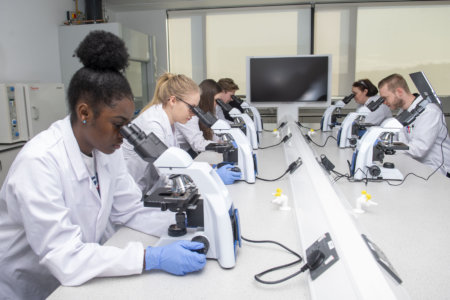Studying abroad is a once-in-a-lifetime opportunity for international students. While it is an exciting milestone for many, the experience of being away from home and stepping into new territory may be filled with unexpected challenges.
At the University of the West of Scotland (UWS), international students settle into their new environment easily, thanks to its vibrant and welcoming campuses. When international students first arrive at UWS, a Fresher’s Week is organised for them to find their footing amongst a sea of new faces. This gives them the opportunity to participate in icebreaker sessions and mingle with students from diverse backgrounds, comprising as many as 70 nationalities. The Students’ Union runs a diverse calendar of social events for every academic term as well, with the opportunity to join student-run societies.

Source: University of the West of Scotland, School of Computing, Engineering and Physical Sciences
Dynamic environment aside, UWS’s scholarly opportunities are just as impressive. Programmes at the School of Computing, Engineering and Physical Sciences are research-informed and industry-relevant, offering applied learning opportunities at every level of study.
Students benefit from UWS research efforts that have a tangible, early and positive impact on society globally. This includes the School’s extensive expertise in research and development and collaborative working relationships with multinational companies, which include well-known global companies such as IBM, NASA, Rolls Royce, BAE Systems, GlaxoSmithKline, Barr Construction, Arup, BP Oils Ltd., CERN and Network Rail.
Another advantage? Programmes that align with industry needs. The proof is in the result: 96% of all UWS students are in work and/or further study six months after graduating (HESA performance indicator 2016/17).
MSc Waste and Resource Management
The MSc Waste and Resource Management is designed for those who want to develop their core skills in the management of resources. “Students will consider how technology can be used to help clean up the environment and in different sectors as we move to a more secular economy and a healthier, cleaner environment,’’ says Dr. Iain McLellan, programme leader.
Upon completion, students will have the fundamental skills and knowledge to complete their master’s dissertation, helping them to apply what they have learned in a real-life context. This gives students the chance to shine and show potential employers in the growing environmental and resource management sector what they have learned throughout the programme.
MSc Chemical Engineering
The MSc Chemical Engineering includes modules such as Advanced Fluid Mechanics & CFD, Advanced Heat Transfer, Separation Processes, Renewable Energy and Energy Storage Systems and more. These are taught through a combination of lectures, tutorials, laboratory sessions, case studies, online activity, specialist guest lectures and more.
Graduates may apply their newfound skills to function in an advanced engineering or business environment, the equivalent of a senior engineer or manager in many industries such as petrochemicals, cosmetics, consumer products, agrochemicals, clean energy, pharmaceuticals, oil and gas as well as in research and development. If you’re a bachelor’s in chemical engineering graduate seeking to qualify for Chartered Engineer status, this is the ideal programme for you.
MSc Civil Engineering
The MSc Civil Engineering equips civil engineering graduates at undergraduate level with the advanced knowledge and skills to support the delivery of infrastructure projects whilst minimising the impact on the natural environment.
On top of satisfying the learning requirements for graduates to acquire the Chartered Engineer (CEng) status, students will harness their skills and knowledge to handle the technical and managerial expectations required by employers.
Graduate prospects are promising for both the public and private sectors, especially those with key activities like construction, design, infrastructure, sustainability, environmental and transportation impacts and project management.

Source: University of the West of Scotland, School of Computing, Engineering and Physical Sciences
The MSc Civil Engineering is accredited by Institution of Civil Engineers (ICE), Institution of Structural Engineers (IStructE), Institute of Highway Engineers (IHE), and Chartered Institution of Highways and Transportation (CIHT), on behalf of the UK Engineering Council as meeting the requirements for Further Learning for registration as a Chartered Engineer under the provisions of UK-SPEC. The MSc also meets the EUR-ACE® Framework Standards.
MSc Mechanical Engineering
The MSc Mechanical Engineering explores advanced mechanical engineering subjects such as advanced fluid mechanics and CFD, applied finite element analysis and structural integrity etc. Students can specialise and focus on a specific subject in more detail through the master’s dissertation.
Upon completion, students are set to land roles within design and development of the automotive, aerospace, offshore, oil and gas and all mainstream mechanical engineering industry sectors. UWS graduates can be found at major international companies such as Rolls Royce; Howden; Doosan Babcock; Babcock International; Spirit AeroSystem; BAE Systems; and Thales Optronics. If you hold a BEng degree and require a further learning element to qualify for Chartered Engineer registration, then consider this MSc.
Follow University of the West of Scotland on Facebook, Instagram, Twitter and Youtube.












